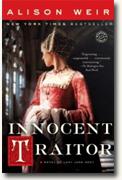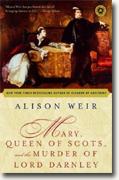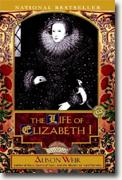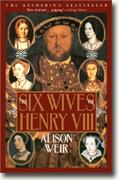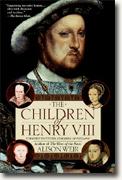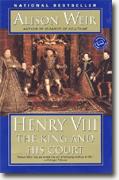author interview
book reviews:
· general fiction
· chick lit/romance
· sci-fi/fantasy
· graphic novels
· nonfiction
· audio books
· author interviews
· children's books @
curledupkids.com
· DVD reviews @
curledupdvd.com
newsletter
win books
buy online
links
home
for authors
& publishiss
for reviewers

|
|||||
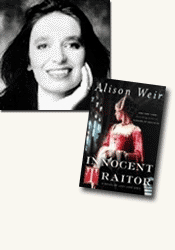 
Curledup.com contributor Luan Gaines conducted an email
interview with historian Alison Weir, author of the recently released novel Innocent Traitor Interviewer Luan Gaines: As a first time novelist and noted historian, what attracted you to Lady Jane Grey’s story? Alison Weir: It was dramatic and poignant – ideal for fiction. I’d always been fascinated by it. And as I had limited time – I was researching Eleanor of Aquitaine when I first wrote this novel, back in 1998 - it was short.
In every way. She grew up bound by the formal manners of her day and was constrained to absolute obedience to her parents and to those of higher rank. As a female of the blood royal in a male-dominated age, she was powerless against those who schemed to use her for their own ends.
Jane’s love of learning is at least in part a means of seeking refuge from her mother’s harshness. The lack of maternal affection is to a large degree compensated for by the love of Jane’s nurse, Mrs. Ellen, who is a more constant presence in her life, but her mother is all-powerful, and there is perhaps something of her in Jane, who is eventually driven to rebel against the Marchioness’s harsh rule.
Until the sixteenth century, noble English girls were rarely well-educated. Sir Thomas More broke the mould by affording his daughters a classical education, and was emulated by Henry VIII and Katherine of Aragon, who provided a similar curriculum for their daughter, the future Mary I. These examples proved that an educated woman could also be a virtuous woman, and they set a trend. Henry VIII’s younger daughter, Elizabeth (I) was rigorously educated, as were various girls from noble families attached to the court, which was a centre of culture and learning. Thus, wishing to follow these examples, and aiming to marry their daughter to Henry’s heir, Prince Edward, Jane’s parents ensured that she too was educated as befitted a Renaissance princess and future queen.
In Tudor England, religious opinions were absolute and polarized, and any deviation from the officially sanctioned faith was regarded as heresy and punished, usually by burning at the stake. When Henry VIII broke away from Rome in the 1530s and declared himself Supreme Head of the Church of England, his church remained Catholic; therefore he burned Protestants for heresy and Catholics for persisting in acknowledging the Pope as head of the Church. Under his successor, Edward VI (1547-53), who had been educated by religious reformers who were closet Protestants, England turned Protestant, and the Catholic faith was outlawed. When Mary I succeeded in 1553, England was received back into obedience to Rome and Catholicism was restored as the official faith of the land. Mary, a fanatical Catholic, revived the heresy laws and burned 300 Protestants, earning herself the nickname ‘Bloody Mary’. When Elizabeth I succeeded in 1558, England reverted to Protestantism and the Anglican Church was founded, with Elizabeth as its Supreme Governor. It was an age of religious fundamentalism, in which religion played a major part in people’s lives, and the question of the correct means to salvation was literally the burning issue of the day. In this context, it is easier to understand why Edward VI and Northumberland schemed to place the Protestant Lady Jane Grey on the throne. Jane witnesses a frightening episode when Katherine Parr is confronted with a scroll that accuses her of heresy, actually signed by the king. How does this unfolding drama affect Jane and her sense of security in the court? Are her religious beliefs not the same as Katherine Parr? Yes, Jane’s religious beliefs are the same as Katherine Parr’s. Fear of what might happen to Katherine – in the light of the burning she has just witnessed in Smithfield – must have rocked Jane’s world and made her feel very insecure indeed, given that Katherine had been so kind to her and had facilitated her escape from her abusive parents.
According to the Act of Succession of 1544, and Henry VIII’s Will of 1546 (which held no force in law and was not binding upon his successor), the order of succession was as follows: Edward and his heirs; then Mary and her heirs; then Elizabeth and her heirs; then the heirs of Henry’s younger sister, Mary Tudor, Duchess of Suffolk. In 1553, these were Frances Brandon, Duchess of Suffolk, then her daughter, Lady Jane Grey. It is not clear why Frances relinquished her claim in favour of her daughter.
Such a marriage would certainly have been feasible, and even desirable, but it was neither on Henry VIII’s agenda nor Edward VI’s. Henry wanted to marry Edward to Mary, Queen of Scots, and so unite England and Scotland under Tudor rule. Edward, in turn, desired to carry out his father’s wishes, but Mary was secretly sent to France, where she was betrothed to the Dauphin. Edward; his advisers then planned a marriage with a French princess, Elisabeth of Valois. Thomas Seymour had far less influence at court than he led others to believe. He thought that by suborning the young King by gifts of money, he could gain his confidence, but that plan misfired disastrously. For all these reasons, his plot to marry Edward to Jane was doomed to failure from the first. As a historian, what do you make of the persistent rumor that Elizabeth had a child by Thomas Seymour? As a historian, I would discount it. The midwife on whose tale this assertion is based could not even identify the young woman whom she was taken in secret to attend to in labour. Apart from the fact that Elizabeth was ill that summer – and she was frequently prostrated with illness as a teenager – there is nothing else apart from malicious rumour to suggest that she had a child by Seymour. As a novelist, however, I might think differently!
I don’t think Elizabeth influenced Jane very much in this way. After all, they were not at court during this period, just living privately with the Queen Dowager. Probably Jane would have looked up to and admired Elizabeth, who was four years older. Through the efforts of John Dudley, Earl of Warwick, Jane finds herself once more in the crosshairs of ambition. Does she have any options in the matter of her future marriage or is she, once again, the helpless pawn of her parents? What are the inherent dangers in the plan? Warwick – soon to be created Duke of Northumberland – was the most powerful man in England. Against his might, and the injunctions of her parents, Jane was powerless. She protested in vain against her marriage, and unsuccessfully did her best to refuse the crown. Northumberland and her parents must have known the dangers to which they were exposing themselves and Jane. The device to change the succession was illegal (it takes an Act of Parliament to repeal an existing Act of Parliament), so Mary remained the rightful heir, and anyone else accepting the crown or plotting to put a pretender on the throne was guilty of high treason. But the stakes were high, and everyone underestimated to extent of popular support for Mary.
In the Renaissance period, it would have been of value to any ruler to be rigorously educated. Courts were repositories of culture, and a monarch or consort needed to be able to converse knowledgeably with the scholars and artists seeking his or her patronage. He/she also needed a grasp of the languages required for successful international diplomacy, and an understanding of theology in an age of religious controversy. So if Jane were to marry the King of England, a classical education would be a distinct advantage. Even if she married a mere nobleman, it would serve her well when it came to interacting at court on an intellectual level, and in educating her children. And, of course, there was a certain personal fulfillment in loving learning for its own sake. After all the years of giving in to her parents’ demands, Jane finally rebels when presented with the crown by Edward’s own order of succession. How does her immediate refusal affect Dudley and her parents? Her refusal can have prolonged the proceedings for only a matter of minutes, but one can imagine how Northumberland and her parents felt about it, as they envisaged their carefully laid plans being wrecked. For Northumberland, there was the prospect of losing his best candidate for the throne, one who was married to his son, and by whom he hoped to found a royal Dudley line. Without her, he could not hope to remain the power behind that throne. For Frances, there is the prospect that she herself might have to step into the breach and take the crown. And for them all, there is the knowledge that their plans would be irrevocably weakened by Jane’s rejection of the throne, and that they ran a higher risk of being accused of treason. For it had taken a lot of manoeuvring on Northumberland’s part to get the lords and judges to accept Jane’s claim, and her refusal might lose him valuable support. What higher motive causes Jane to change her mind and agree to accept the crown? Is this decision in her best interests or is she simply seduced by an opportunity to protect the citizens from the heresy of Catholicism? By Jane’s own account, she prayed to God for guidance, but received no reply. This suggested strongly to her that her duty lay clear: she must obey her parents. And in doing their bidding, of course, she would be the instrument through which the kingdom would be saved from Catholicism. This must have been a powerful factor in her decision reluctantly to accept the crown. But by her own admission also, she knew she was on shaky ground legally.
The reality is that people were flocking to Mary’s banner from all over England. Northumberland had vastly overestimated his own support, and during the nine days of Jane’s reign, his fellow councillors were steadily abandoning him. Jane was apparently not taken fully into the council’s confidence, but she seems to have understood the seriousness of the situation, for when Northumberland chose her father to lead a force against Mary, Jane insisted that he himself go instead. She must have realised that her father could only compound his treason by being taken in open rebellion against the rightful Queen, which was what in fact happened to Northumberland. Jane’s new husband, the insensitive Guilford Dudley assumes he will be made king and rule the country beside his wife. Once again, Jane rebels. In this instance, can she prevail? Jane can only prevail against Guildford’s demands until the matter is laid before Parliament, a parliament that – had things gone the way Northumberland planned – would certainly have done his bidding. In perhaps the most ironic event of Jane’s young life, it is her devotion to religion that stands in the way of a freedom. Can you speak to the terrible choice Jane faces and why she is unable to do the one thing that can save her life? We’re back to this issue of religious fundamentalism. Jane believed that the Protestant faith was the only means of attaining eternal life; that is why she was so distressed at bidding farewell to Abbot Feckenham on the scaffold, because she was convinced that he, as a Catholic, was destined for Hell, and that they would never meet again in the hereafter. For her, dying a Protestant is therefore the only means of attaining salvation and Heaven; there is no choice in the matter. Mary is faced with a conundrum as well: fear that the Protestants will rally around Jane, given the opportunity, if she is freed from the tower. Both these figures are caught by the political events that restrict their choices. Given different circumstances, might they be sympathetic to one another? Are they not similar in some ways? There is no doubt that Mary was sympathetic towards Jane, on account of her youth and the fact that she had been the helpless tool of others. She did everything she could to save her. But Jane was never very sympathetic towards Mary, even though she acknowledged her right to the crown. Jane was openly disapproving of Mary’s religion, and made no secret of that when she was in the Tower, which seems a rash thing to do in the circumstances. Had she lived, or even ruled, she would probably been as fanatical a Protestant as Mary was a Catholic. In that respect, the two are similar. And, of course, both are the victims of circumstances beyond their control.
Not too significant. She was little known, she did not attract a following and she was queen in name only for just nine days. She left no legacy, unless one counts the crown’s continuing distrust of members of her family, who were too near in blood for comfort. Her story merely illustrates the power struggles of the day, which were informed by religion, personal ambition and a desire for political control. Throughout the novel, I am constantly struck by Jane’s youth; she is only sixteen when crowned queen. Is it not troubling that such a figure can be manipulated from her childhood, not even attaining adulthood before falling victim to the machinations of those around her? It is very troubling indeed, and it demonstrates how far the ruthless operators of the day were prepared to go to achieve their ambitions – they did not scruple to use one so young and innocent to further their dangerous plans. Of course, in Tudor eyes, Jane was virtually a woman. There was no concept of childhood as a separate phase of development. Children were miniature adults who had to be civilized as soon as possible. Girls could marry and cohabit at twelve, boys at fourteen; boys as young as eleven went to war. So a girl of fifteen (sixteen, according to very recent research) sitting on the throne was not thought so unusual, for several monarchs had succeeded as infants. Yet a royal minority often brought with it power struggles and intrigues, as had been seen repeatedly in Scotland for well over a century. Unsurprisingly, there was an old adage, Woe to thee, O land, when thy king is a child. How apposite in Jane’s case. Lady Jane Grey’s progression to queen, if only for nine days, is a convoluted path at best, the pawn of the ambition of others. How does her life define the role of women of that era, especially those with royal blood? Her experience demonstrates how constrained royal women were to obey and serve their parents, their menfolk and their rulers. A woman in that age knew little autonomy, and – as Jane’s story shows – could be easily overruled. How was writing fiction different for you? What was most challenging? Most rewarding? Writing fiction was particularly liberating; at last, I could let my imagination rip. I could get inside the heads of characters with whom I had long been familiar, and actually be them. That was the most rewarding part. The most challenging aspect was getting the language right. Having studied Tudor sources over several decades, I knew a lot of idioms, and where there was contemporary speech, I used it, sometimes out of context, taking care to modernize it slightly so that it would not appear incongruous in a twenty-first-century text. But you can never please everyone – some reviewers said I’d got it just right, others complained about anachronisms. To me, it felt right, and I had to make it accessible to the widest-possible audience, so I felt that the deliberate use of a few anachronisms was permissible. Now that you have written a novel, have you plans for another? If so, can you share anything about your next project? I’m writing a second novel at the moment. Entitled The Lady Elizabeth, it is about the early life of Elizabeth I, up to her accession. And I’m planning to make it very controversial! More than that, I am not prepared to say! Wait and see… Alison Weir is the New York Times bestselling author of Eleanor of Aquitaine; Mary, Queen of Scots and the Murder of Lord Darnley; The Six Wives of Henry VIII; Queen Isabella; and several other historical biographies. She lives in Surrey with her husband and two children. Contributing reviewer Luan Gaines interviewed Alison Weir, author of Innocent Traitor (see accompanying review), about her book for curledup.com. Luan Gaines/2007.
|
|||||
| fiction · sf/f · comic books · nonfiction · audio newsletter · free book contest · buy books online review index · links · · authors & publishiss reviewers |
|
| site by ELBO Computing Resources, Inc. | |

